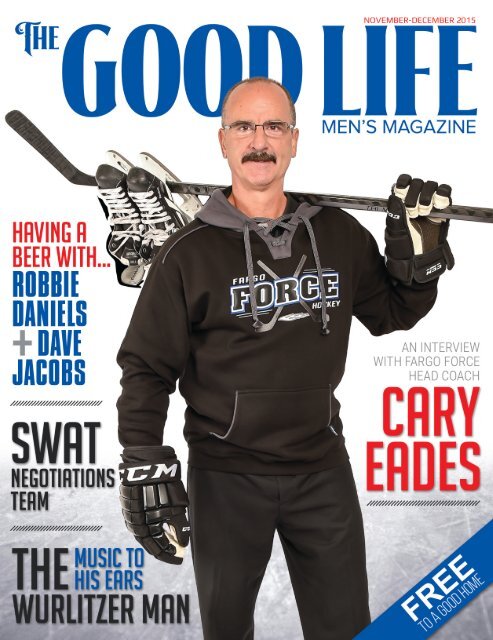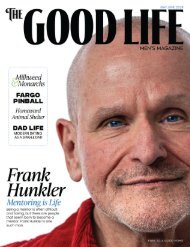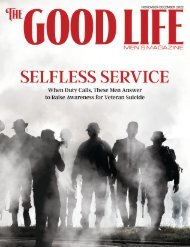The Good Life – November-December 2015
Featuring USHL hockey coach, Cary Eades. Local Heroes - SWAT Negotiations Unit, a day in the life of a flight instructor, and more in Fargo Moorhead's only men's magazine.
Featuring USHL hockey coach, Cary Eades. Local Heroes - SWAT Negotiations Unit, a day in the life of a flight instructor, and more in Fargo Moorhead's only men's magazine.
Create successful ePaper yourself
Turn your PDF publications into a flip-book with our unique Google optimized e-Paper software.
3
BY: MATT LACHOWITZER | PHOTO: URBAN TOAD MEDIA<br />
When it comes to recognizing issues with your vehicle, using your senses is a good indicator that something<br />
could be wrong. In this article, which is the first in a series of 4, we will talk about how becoming in-tune with<br />
your senses (your sense of smell in this article) can help aid in recognizing issues with your vehicle.<br />
When there is a burning smell while preparing your food, it’s generally a good indicator something isn’t right<br />
correct? <strong>The</strong> same rule of thumb applies when it comes to your vehicle. Any abnormal smell generally is an indication<br />
something isn’t right. Some odors are only apparent when the vehicle is running, others when it’s hot,<br />
and others when its sitting, so here are a few examples of what you may be smelling and what systems of your<br />
vehicle they may be coming from.<br />
Hot Burning Oil: A scent that is somewhat thick,<br />
heavy, and sometimes accompanied by smoke coming<br />
out from under the hood or the exhaust, is usually<br />
an oil leaking or burning issue.<br />
Maple Syrup: A sweet odor that’s usually accompanied<br />
by steam from under the hood of the vehicle<br />
could be a coolant or Antifreeze leak.<br />
Burnt Toast: A light, somewhat pungent odor, could<br />
be an indicator of an electrical short.<br />
2<br />
Gym Socks: When turning on your heater/air conditioning<br />
and you get a whiff of your high school gym<br />
locker, that is a good indication that you have good<br />
old mildew growing inside of your A/C evaporator and<br />
possibly a plugged cabin air filter.<br />
Rotten Eggs: Sulfur or rotten egg smell that’s continuous<br />
could be a sign of emission failure.<br />
Burnt Paper: A smell that resembles that of burning<br />
the Sunday paper could be an overheated clutch.
Metal: A metallic odor that is hot usually accompanied<br />
by a sweet odor of antifreeze or<br />
coolant could be a symptom of your vehicle<br />
overheating.<br />
Burnt Carpet: A smell that will typically omit<br />
from the wheel area of your vehicle after the<br />
brake pads have been overheated.<br />
A Gas Station: This is typically raw gasoline.<br />
Any fuel smells will usually indicate there is a<br />
leak in the fuel system<br />
Hell: This is the smell of sulfur (formally<br />
called brimstone) and usually indicates gear<br />
lube leaking from the manual transmission,<br />
transfer case, or differential housing; or that<br />
one of those components has overheated.<br />
Burning Rubber: This is typically a smell<br />
emitted from the engine compartment and<br />
indicates an issue with the drive belts of the<br />
vehicle.<br />
Exhaust: This can be the result of oil burning<br />
in the engine compartment or a faulty<br />
exhaust pipe that is allowing exhaust gas to<br />
enter the cab of the vehicle.<br />
ALWAYS consult with a professional at the<br />
Automotive Service Center of your choosing<br />
when it comes to any issues that you smell,<br />
especially since it could be an issue bigger<br />
than expected. Also, when talking with your<br />
automotive professional, make sure to talk<br />
about the particular scent being smelled<br />
along with any other relevant information to<br />
make the diagnostic process easier.<br />
Just remember, smells are important in detecting<br />
issues, just like when food is being<br />
prepared. If you can smell any of the odors<br />
listed above, be sure to have your vehicle<br />
looked at by a professional service center.<br />
Thank you for reading and stay tuned for Part<br />
2 of Recognizing Vehicle Issues Using Your<br />
Senses. ■
VOLUME 3 • ISSUE 3<br />
NOV•DEC<br />
<strong>2015</strong><br />
IN EVERY ISSUE<br />
02<br />
12<br />
16<br />
34<br />
CAR CARE<br />
RECOGNIZING VEHICLE ISSUES USING YOUR<br />
SENSES - PART 1<br />
FATHERS<br />
REMEMBERING MILITARY FAMILIES DURING<br />
THE HOLIDAYS<br />
HAVING A BEER WITH ...<br />
ROBBIE DANIELS AND DAVE JACOBS<br />
LOCAL HEROES<br />
SWAT NEGOTIATIONS UNIT: HOW UTILIZING<br />
BASIC SKILLS RESOLVES CRISIS SITUATIONS<br />
08<br />
28<br />
02<br />
ON THE COVER<br />
20<br />
MAKING A WINNING TRADITION<br />
AN INTERVIEW WITH FARGO FORCE<br />
HEAD COACH CARY EADES<br />
PUBLISHED BY • Urban Toad Media LLP<br />
www.urbantoadmedia.com<br />
<strong>The</strong> <strong>Good</strong> <strong>Life</strong> Men’s Magazine is distributed six times a year by Urban Toad Media LLP.<br />
Material may not be reproduced without permission. <strong>The</strong> <strong>Good</strong> <strong>Life</strong> Men’s Magazine<br />
accepts no liability for reader dissatisfaction arising from content in this publication. <strong>The</strong><br />
opinions expressed, or advice given, are the views of individual writers or advertisers<br />
and do not necessarily represent the views or policies of <strong>The</strong> <strong>Good</strong> <strong>Life</strong> Men’s Magazine.
16 34<br />
CONTENTS<br />
06<br />
08<br />
26<br />
CONTRIBUTORS<br />
MEET THIS ISSUES CONTRIBUTING WRITERS<br />
CLASSES IN THE CLOUDS<br />
AN AFTERNOON AT THE FARGO JET CENTER<br />
THE TROUBLING TASTES OF TRADITION<br />
REMEMBERING HORRID HOLIDAY MEMORIES<br />
OF MEALS PAST<br />
28<br />
32<br />
MUSIC TO HIS EARS<br />
THE WURLITZER MAN ON FALLING IN LOVE<br />
WITH THE ORGAN<br />
HELP FOR THE HOLIDAYS<br />
DEALING WITH LOSS DURING THE HAPPIEST<br />
TIME OF THE YEAR<br />
OWNER | CREATIVE DIRECTOR • Dawn Siewert • dawn@urbantoadmedia.com<br />
OWNER | PHOTOGRAPHY • Darren Losee • darren@urbantoadmedia.com<br />
ADVERTISING INQUIRIES<br />
dawn@urbantoadmedia.com • 701-388-4506<br />
darren@urbantoadmedia.com • 701-261-9139<br />
michelle@urbantoadmedia.com • 701-361-1760<br />
READ AN ISSUE ONLINE: issuu.com/thegoodlifemensmag<br />
FOLLOW URBAN TOAD MEDIA<br />
ON TWITTER & FACEBOOK5
<strong>The</strong>y take their work seriously!<br />
Jessica Ballou is a proofreader by<br />
day, freelance writer and blogger<br />
at www.beyoutiful-beauty.com by<br />
night. She also works part time at<br />
a beauty store where she gets paid<br />
to gush about lipstick and eye<br />
shadow. She has a very sarcastic<br />
sense of humor and frequently<br />
quotes TV shows and movies. She<br />
graduated from Concordia College<br />
in 2012 with a bachelor's in print<br />
journalism. She lives in Fargo with<br />
her boyfriend and adorable black<br />
lab/dachshund mix named Bella.<br />
Danielle Teigen is a word nerd.<br />
She considers it a hazard of the<br />
trade — she’s a professional<br />
communicator with a background<br />
in journalism, marketing, and<br />
public relations. Editing is one of<br />
her favorite activities, as is writing.<br />
Read her work at danielleteigen.<br />
areavoices.com. When she isn’t<br />
writing, Danielle enjoys running,<br />
watching movies, and spending<br />
time with her husband and twoyear-old<br />
son. Both provide plenty<br />
of humor in her life and her<br />
writing. Follow her on Twitter at<br />
@danielleteigen.<br />
Matt Lachowitzer is the Owner<br />
and Founder of Matt’s Automotive<br />
Service Center, located in Fargo at<br />
3007 Main Avenue and in Moorhead<br />
at 1234 1st Avenue North. He is an<br />
ASE Certified Master Technician<br />
with over 20 years of proven<br />
experience. Matt was recently<br />
awarded Entrepreneur of the Year<br />
by the Fargo/Moorhead/West<br />
Fargo Chamber of Commerce and<br />
Matt’s Automotive was recently<br />
named <strong>The</strong> best place to have<br />
your vehicle serviced and repaired<br />
by the Fargo Forums “Best of the<br />
Red River Valley”. Matt and his<br />
wife, Char, along with their three<br />
children, Kalin, Ryker, and Krimsyn,<br />
reside in rural North Dakota where<br />
they enjoy being outdoors and<br />
living in the country. Visit www.<br />
mattsautoservicecenter.com.<br />
6
Paul Hankel has lived in Fargo his entire life. He<br />
tried moving away, but came right back! A selfdiagnosed<br />
workaholic, Paul loves anything having<br />
to do with marketing, promoting and bringing<br />
attention to the Fargo-Moorhead area. He writes<br />
for several local and regional publications<br />
and is also a full time marketing consultant.<br />
According to Paul, the lifestyle, the people, and<br />
the opportunities that lie within our city and our<br />
region are almost overwhelming! When he’s not<br />
working, Paul loves spending time with his family,<br />
working on their new house, and going out for<br />
beers with Darren and Dawn!<br />
Meghan Feir On a stormy Wednesday morning<br />
many moons ago, Feir (pronounced “fear”)<br />
was born, so according to Mother Goose, she<br />
has issues. She prefers decaffeinated coffee<br />
and long walks on the beach (as opposed to<br />
caffeinated short ones). An old soul paired with<br />
the enthusiasm of a 5-year-old child, Feir loves<br />
Jesus, words, music, classic movies, the Oxford<br />
comma, and real flannel. According to her, she<br />
lives in the North, not the Midwest. Visit her blog<br />
at meghanfeir.wordpress.com.<br />
7
8<br />
BY: PAUL HANKEL | PHOTOS: URBAN TOAD MEDIA
A glimpse into the day to day life of a flight instructor,<br />
when your office is located at 10,000 feet!<br />
o begin this assignment, this writer sat down<br />
and made a list of any and all jobs that could<br />
possibly be more fun and interesting than being<br />
a flight instructor. I can up with the following:<br />
professional golfer, professional video game<br />
player, professional poker player, and being the food and<br />
wine, or nightlife writer for any magazine.<br />
<strong>The</strong> first three would be awesome. However, they require a lot<br />
of luck, practice and talent to achieve. <strong>The</strong>re’s also a limited<br />
window in which to do the job, as skill sets deteriorate. <strong>The</strong><br />
last one, while fun and exciting, would make you tired,<br />
disillusioned due to too much of a good thing, and would<br />
wreak havoc on your waistline.<br />
Pretty much every male walking this planet has dreamed of<br />
being a pilot, whether it be flying fighter jets or flying gigantic<br />
Boeing airplanes across the country and world. <strong>The</strong> thrill of<br />
flying thousands of feet in the air at hyper fast speeds, seeing<br />
new parts of the country and world, and the prestigious<br />
status one has as a pilot are enough to make being a pilot<br />
attractive to anyone.<br />
What a lot of people forget about is that someone has to<br />
teach those, ‘flyboys,’ how to fly! That’s where Mike Paulson<br />
and Steve Schlangen of the Fargo Jet Center come in to<br />
play. Both former military members, with a passion for<br />
aviation, Paulson and Schlangen both flew commercially<br />
and privately, before becoming flight instructors at Fargo Jet<br />
Center. For years now, they have been teaching people how<br />
to fly, in order to get their private aviation and other types of<br />
flight licenses.<br />
9
Mike Paulson<br />
• Flight School Manager, Fargo Jet Center<br />
• From Fargo, North Dakota<br />
• Gained interest in flying from playing with model planes as a child<br />
• Started flying in 1973, while still in high school<br />
• Earned his Private Pilot License and joined Air Force ROTC<br />
• Was a flight navigator in the Air Force<br />
• Left the Air Force and flew freight, life flights<br />
• In 1989 took over managing Valley Aviation, now Fargo Jet Center,<br />
in Fargo<br />
Steve Schlangen<br />
• Assistant Chief Flight Instructor, Fargo Jet Center<br />
• From La Crosse, Wisconsin<br />
• Gained interest in flying from exploring the technical challenge of flying<br />
• Graduated from the University of Minnesota with an Aerospace<br />
• Engineering degree in 1982<br />
• Employed by the Navy as a Civilian Contractor in 1982<br />
• Received his Private Pilot License in 1983 from a Navy flying club<br />
• Worked in Naval Engineering<br />
• Left the Navy and moved to Reno, Nevada to pursue advanced<br />
flight training<br />
• Moved to Fargo in 1996 and flew corporate flights<br />
• Joined the Fargo Jet Center as an instructor in 2012<br />
Paulsen and Schlangen’s histories and<br />
reasons for teaching are varied, however<br />
their reasons stem from a love for flying and<br />
a passion for helping others learn the art. “I<br />
really enjoy the variety,” said Paulsen, “We<br />
train people in the areas of private aviation<br />
all the way up to commercial aviation. Every<br />
day is different. We may have up to five or six<br />
different training flights per day, of varying<br />
types.” For Schlangen, it was the love of<br />
flight that he sees in his students, “I’ve never<br />
been in a sector of work where students are<br />
so passionate about what they’re doing.<br />
People (here) are motivated, and its people<br />
that share the same passion for flying as I<br />
do.”<br />
What a lot of people don’t realize is that<br />
almost anyone can be a privately licensed<br />
pilot. While there are some physical<br />
limitations, most anyone with the time,<br />
resources, and desire to fly can become<br />
commercially licensed.<br />
Fargo Jet Center Flight School: What you need to know<br />
• <strong>The</strong>re is no FAA minimum age limit to begin flying lessons; however you<br />
must be 16 years old to fly solo, and 17 years old to be certified as a pilot.<br />
• Fargo Jet Center has had students as young as 12 years old!<br />
• Flight school consists of classroom time, web-based and in-plane education<br />
• Flight school is flexible. Students learn and advance at their pace.<br />
• Students could graduate in as soon as 2-3 months, or take several years<br />
• Students are trained in airplanes as well as flight simulators<br />
• You don’t have to own a plane to be a pilot. Fargo Jet Center and other<br />
centers rent out planes, such as the Cessna 172, for hourly wet fees<br />
(fuel included)<br />
• While rather expensive to get, your private aviation license is life-long,<br />
as long as you keep it up to date<br />
10
Cessna 172 Skyhawk<br />
4-seater<br />
Very popular as a training aircraft because of its easiness to fly and durability<br />
Can fly up to 14,000 feet<br />
Ideal cruising altitude is 4,000 - 9,000 feet<br />
Top speed of 188 mph<br />
<strong>Life</strong> in the clouds is always a good time,<br />
according to Paulson and Schlangen,<br />
especially when it’s what you do for<br />
a living. <strong>The</strong>y’ve been instructing for<br />
years and show no signs of stopping.<br />
When asked what living the good life<br />
meant to them, they looked at each<br />
other, smiled and said, “This!” Turning<br />
a childhood interest into a lifelong<br />
career of helping people make their<br />
dreams come true…not a bad way to<br />
make a paycheck.<br />
Need something to do for an<br />
anniversary or date night? Interested<br />
in taking flying lessons, but want to try<br />
it out first? Call Mike and Steve at the<br />
Fargo Jet Center and they’ll take you on<br />
a Discovery Flight. For $149.00, they’ll<br />
give you a tour of their flight facility,<br />
take you and one guest up on a flight,<br />
and show you what Fargo-Moorhead<br />
and the surrounding areas look like<br />
from a few thousand feet up! ■<br />
11
12FATHERS
Remembering<br />
Military<br />
Families<br />
During the<br />
Holidays<br />
During the holiday season,<br />
many of us turn our attention<br />
to those in need. One group<br />
that endures great hardship,<br />
but is often overlooked,<br />
is the military family. Most of us<br />
do not stop to think about the<br />
responsibilities and pain these<br />
families bear <strong>–</strong> especially around the<br />
holidays. Throughout the year, they<br />
sacrifice time spent with their spouse<br />
or parent during deployments, they<br />
sacrifice friendships and a stable<br />
home life each time they move across<br />
country, and they sacrifice peace of<br />
mind because they love someone in a<br />
dangerous occupation.<br />
<strong>The</strong>se stresses are only magnified from<br />
Thanksgiving to New Year’s Day. And<br />
even though military deployment is<br />
necessary to help keep peace around<br />
the world, for military families it<br />
means long separations, emotional<br />
distress and lifestyle adjustments.<br />
While ordinary working parents may<br />
say goodbye to their children for<br />
the next eight hours, parents leaving<br />
for deployment say goodbye for the<br />
next six months. Imagine missing<br />
the birth of your child; fearing your<br />
infant will forget who your are; or<br />
feeling guilt over knowing your<br />
spouse is struggling alone, while at<br />
the same time worrying that your<br />
family will do a little too well without<br />
you. <strong>The</strong> family left at home doesn’t<br />
have it much easier. Military spouses<br />
13
FATHERS<br />
14<br />
suddenly find themselves in the role of single parent<br />
<strong>–</strong> taking on the roles of mother, father, accountant,<br />
mechanic, home repair expert and full-time chauffeur<br />
of the family - often in cities where they have no family<br />
to call upon for support.<br />
Deployment during the holidays means that the<br />
military dependents commemorate Christmas dinner<br />
and ring in the New Year as an incomplete unit, while<br />
the deployed member spends the day without family<br />
in a foreign, or even hostile country. Imagine how<br />
heartbreaking it must be for a parent consoling a child<br />
who doesn’t understand why Mommy or Daddy can’t<br />
be home with them to enjoy the Thanksgiving turkey,<br />
open presents on Christmas or watch the fireworks on<br />
New Year’s Eve.<br />
Military families are also called upon to move often <strong>–</strong><br />
relinquishing a stable home life, leaving behind friends,<br />
and the negative impact of this transient lifestyle can<br />
hit the hardest during the holidays. This is a season<br />
meant to be celebrated with loved ones, but what about<br />
the military family who just moved to a new town and<br />
can’t afford to travel to visit family or friends? Another<br />
way that military families sacrifice is the emotional toll<br />
from worrying over the safety of their loved one and<br />
the stress of this lifestyle. But even with these powerful<br />
emotions present, they try to keep the holiday mood<br />
festive even though part of their family is away.<br />
So, as you consider helping those in need this holiday<br />
season or throughout the year, recognize the many<br />
sacrifices military families make. If you know a military<br />
family with a deployed spouse, consider making them<br />
a part of your family over the holidays. Invite them over<br />
for Thanksgiving dinner, offer to take a family holiday<br />
portrait to send to the deployed family member, or give<br />
them long distance phone cards to help them keep<br />
in touch. However you may choose to help a military<br />
family, consider it a gesture of thanks for the sacrifices<br />
they have made to help preserve our freedom. By<br />
serving their families, you are honoring those who<br />
serve our country. ■<br />
Copyright <strong>2015</strong> Family First. All Rights Reserved.<br />
Reprinted with permission.
GIFT IDEAS<br />
This holiday season Urban Toad Media LLP<br />
and <strong>The</strong> <strong>Good</strong> <strong>Life</strong> Men’s Magazine would like<br />
to thank all the members of our military and<br />
their families. Thank you for your sacrifice and<br />
your dedication.<br />
Please remember these brave men and<br />
woman who give so much every day. Don’t<br />
forget to add them to your holiday shopping<br />
list.<br />
Please consider a gift to one of the many<br />
charities that support our military members<br />
and their families. One less gift under your tree<br />
could make the world of difference to someone<br />
else.<br />
Wounded Warrior Project<br />
www.woundedwarriorproject.org<br />
Fisher House<br />
www.fisherhouse.org<br />
Folds of Honor<br />
www.foldsofhonor.org<br />
Soldier’s Angels<br />
www.soldiersangels.org<br />
Veteran Tickets<br />
www.vettix.org<br />
Operation Homefront<br />
www.operationhomefront.net<br />
Don't forget<br />
the service dogs!<br />
<strong>The</strong> United States War Dogs Association<br />
www.uswardogs.org<br />
15
<strong>Good</strong> <strong>Life</strong>: If Batman and Superman were in high<br />
school together, what sports would they each have<br />
been in?<br />
Robbie: Superman would obviously be in track<br />
because he’s fast. Is speech a sport? That’s what<br />
Batman would do.<br />
<strong>Good</strong> <strong>Life</strong>: In what order would these three things be<br />
in the food chain?<br />
1. A cob of corn<br />
2. A bison<br />
3. A dragon<br />
Dave: A dragon’s on top of the food chain. He’s going<br />
to eat the bison, and the bison eats the corn, which in<br />
turn fertilizes the earth.<br />
Robbie: I’m with Dave.<br />
Dave: Are you from MSUM, by the way?<br />
<strong>Good</strong> <strong>Life</strong>: Moving on…<br />
Bribed with beer, Robbie<br />
Daniels and Dave Jacobs, two<br />
radio personalities for 107.9 <strong>The</strong><br />
Fox, bravely stepped up to the<br />
table, had a seat and answered<br />
odd questions at Drekker Brewing<br />
Company. <strong>The</strong> coworkers have<br />
been on the air together for 20<br />
years, resulting in a friendship that<br />
constantly plays off each other.<br />
<strong>The</strong>y may be on the air every<br />
morning dishing out their two<br />
cents, but there are plenty of tidbits<br />
you don’t know about them. Read<br />
on, you curious cats.<br />
16
GL: If you could make up a law for Fargo-Moorhead,<br />
what would it be?<br />
R: We tend to not get too deep into the issues. We’re<br />
kind of in the fluff of the issues.<br />
D: We mock the issues more than try to solve them,<br />
that way we feel like we’re helping.<br />
R: I think I’d like to see the cities of Fargo and Moorhead<br />
working together a little more than they do, just ‘cause<br />
they both have so much to offer. It’s fun to see that<br />
Fargo is getting to be such a young, progressive town.<br />
D: It’s becoming more and more diverse in a positive<br />
way.<br />
GL: What are your thoughts on man buns? I’m not<br />
talking about man butts.<br />
R: I don’t mind them.<br />
D: I’m not here to judge.<br />
R: It’s a trend. It’s a style. It looks good on some guys.<br />
D: Some dudes are into wearing ‘em. If he can’t pull it<br />
off, then he won’t have any friends, and that’s sad.<br />
GL: Did either of you fall asleep while watching any of<br />
the three installments of “<strong>The</strong> Hobbit” adaptations in<br />
the theater?<br />
D: Yes, but I still enjoyed them.<br />
R: <strong>The</strong> first one, I couldn’t get past the dinner scene<br />
because it seemed too <strong>–</strong><br />
D: Stupid?<br />
R: Too game-like, and I love “<strong>The</strong> Hobbit.”<br />
D: I do too, but I’m so familiar with “<strong>The</strong> Hobbit” and<br />
“<strong>The</strong> Lord of the Rings,” so I can fall asleep and know<br />
what’s going on, anyway.<br />
GL: Did you ever have an imaginary friend or animal?<br />
R: I did not.<br />
D: I did. In fact, it’s a weird story. I remember living<br />
in southern Alabama and we had swamps behind<br />
our house. My imaginary friend was a pirate and he<br />
brought me back out into the swamp. <strong>The</strong>y always talk<br />
about “when they lost Davey,” and there were gators<br />
out there. To this day, I remember following him out,<br />
so I don’t know if he was some sort of ghost pirate<br />
or <strong>–</strong> I don’t know. We didn’t even find any treasure or<br />
anything.<br />
17
GL: What’s the weirdest quirk about the other person?<br />
R: You first.<br />
D: She has chip clips in her hair in the morning.<br />
R: <strong>The</strong>y’re not chip clips.<br />
D: Yes, they are. It says Frito-Lay on one of them.<br />
R: No, it does not. I have a poof problem, so I need to<br />
use clippies to have it go where I want it to go… We’ve<br />
been together for a long time. He’s approaching 50<br />
and I’m over 50, so we notice those quirky things. Like,<br />
Dave, how many times did I have to tell you where<br />
Drekker’s was, and I finally said, “C’mere, gimme your<br />
hand. I’ll lead you there.” I think the beauty of working<br />
together as long as we have is we know our strengths<br />
and weaknesses, you know, like, I can’t pronounce<br />
words, so Dave’ll do it for me.<br />
GL: What’s the strangest thing that’s ever happened<br />
on your radio show?<br />
R: Well, we had a stalker once, way back in the day. He<br />
was just an oddball who would call us and tell us the<br />
radio was in his head.<br />
D: I told him, “Don’t worry, we’re switching to digital,<br />
so that won’t happen anymore.” He believed it.<br />
R: We haven’t seen him for years.<br />
GL: What is something you wish everyone knew?<br />
D: How to be polite. Manners. People have forgotten<br />
their manners. Now I’m going to add my new<br />
law. You’re going to get a ticket if you forget your<br />
manners.<br />
R: People are so rude. You don’t know what people<br />
are going through.<br />
D: Everybody’s got their fights. <strong>The</strong>re’s nothing<br />
wrong with being polite.<br />
R: Be nice.<br />
GL: What does “the good life” mean to you?<br />
D: To me, the good life is to keep things simple. You<br />
make more money, you spend more money. How<br />
much do you really need? All you need is a pint a<br />
day, and that’s of whatever gets you through the<br />
day. I’m not saying to be an alcoholic. What I mean<br />
is, keep your life simple.<br />
R: You know, the good life for me is simple, too. I’m<br />
blessed with family, I’m blessed with children, and<br />
I’m blessed with great co-workers. I really am. I have<br />
the good life. ■<br />
18
19
“It all starts with effort and work ethic.<br />
We want our players focused,<br />
and to bring their lunch buckets and<br />
work boots to work every day.”<br />
— Cary Eades, Head Coach, Fargo Force<br />
Coach Cary Eades brings a<br />
tradition of excellence and winning<br />
with him, as he takes over as head<br />
coach of the Fargo Force.<br />
20
MAKING A<br />
WINNING TRADITION<br />
An Interview With Fargo Force Head Coach Cary Eades<br />
BY: PAUL HANKEL | PHOTOS: URBAN TOAD MEDIA<br />
On an off the ice, Fargo<br />
Force head coach<br />
Cary Eades has<br />
had a remarkable<br />
career. Following his<br />
successes on the ice,<br />
he began coaching some thirty years<br />
ago. Following a successful tenure as<br />
head coach of the Sioux Falls Stampede,<br />
Eades was named head coach of the<br />
Fargo Force. He takes over a squad that,<br />
despite two down season, is hungry to<br />
return to the top of their league. <strong>The</strong><br />
<strong>Good</strong> <strong>Life</strong> met up with Eades at the<br />
arena to chat about his hockey career,<br />
his life and his plans for the Force this<br />
season.<br />
THE GOOD LIFE: You were born and<br />
raised in Vancouver, British Columbia.<br />
Canada is often seen as one of hockey’s<br />
Mecca’s. What made you want to leave<br />
one of the most dominant hockey<br />
countries to play and coach in the<br />
United States.<br />
CARY EADES: I grew up in the<br />
Vancouver, British Columbia area. I<br />
played my youth and junior hockey<br />
there. <strong>The</strong>n, I got a college scholarship<br />
and that brought me to this country<br />
and area of the country for the first<br />
time, and I really loved it here. I love<br />
the upper Midwest, and the people and<br />
the values that are here. It’s nice to be<br />
back in an area that I’ve spent 19 years<br />
of my adult life in!<br />
GL: Before you began coaching, you<br />
played college and professionally, correct?<br />
CE: Yes, I played my junior hockey in<br />
British Columbia and got a scholarship<br />
to play at the University of North<br />
Dakota.<br />
Eades was a standout Forward at<br />
<strong>The</strong> University of North Dakota.<br />
His teams won the 1980 and 1982<br />
WCHA Championships. Following a<br />
stellar college career, Eades earned the<br />
opportunity to play professionally.<br />
However, an injury forced Eades to<br />
retire early and shift his attention from<br />
being a player to coaching. He returned<br />
to the University of North Dakota,<br />
where he spent a total of 15 years as<br />
an assistant coach, from 1984 to 1991,<br />
and again from 2004 to 2012. While<br />
there, Eades has the honor of coaching<br />
under such UND head coaching greats<br />
as Gino Gasparini, Dean Blais, and<br />
Dave Hakstol. In between his two stints<br />
at UND, Eades was the head<br />
coach at Warroad<br />
High School, where his teams won<br />
three Class 1A championships. He also<br />
coached the Dubuque Fighting Saints,<br />
out of South Dakota, and led them to a<br />
championship in 1991.<br />
21
Eades left the University of North<br />
Dakota and took over as head coach of<br />
the Sioux Falls Stampede. While there,<br />
Eades team made the USHL Playoffs<br />
all three years, winning the USHL Cup<br />
in his last season.<br />
“I don’t think there’s anyone out there<br />
who puts more pressure on<br />
themselves to win than I do.”<br />
— Cary Eades<br />
CE: I came back to UND after playing<br />
professionally for a few years. I<br />
learned a lot from those guys, I’ve<br />
been really lucky. I’m now in my 32nd<br />
or 33rd year of coaching, and it’s been<br />
a great profession, with not too many<br />
stops along the way. I coached in<br />
Dubuque, Iowa, Warroad, Minnesota,<br />
back to Sioux Falls, South Dakota,<br />
and now here.<br />
GL: You’re coming from Sioux Falls,<br />
where you had a lot of success. What<br />
are some of the challenges the Force<br />
will face this year?<br />
CE: <strong>The</strong>re are always challenges in<br />
coaching, especially when you’re<br />
transitioning into a new situation.<br />
<strong>The</strong>re are a lot of unknowns. Players<br />
have to get to know me and get used<br />
to my coaching style, my nuances, my<br />
pet peeves, and what makes me happy.<br />
Early on in his coaching career, Eades<br />
was referred to as the, ‘Latin American<br />
dictator,’ by some of his colleagues.<br />
While he says his style of coaching<br />
has softened since then, Eades still<br />
demands certain things from his<br />
players: a winning attitude, hard and<br />
work and focus every day. He’s also a<br />
stickler for punctuality, meaning that<br />
if a team meeting starts at 11:00am,<br />
you’re there at 10:59:59.<br />
CE: It all starts with effort and work<br />
ethic. We want our players focused,<br />
and to bring their lunch buckets<br />
and work boots to work every day.<br />
<strong>The</strong> USHL is a tough league, and the<br />
season is more of a marathon than<br />
a sprint, and that takes adjusting to.<br />
Nowadays, I’m a little bit less of a<br />
dictator and take a more democratic<br />
approach. Player input, especially<br />
with today’s generation is crucial.<br />
<strong>The</strong>y ask why, and I think, if you take<br />
22
23
the time to explain why, they’ll respond<br />
better.<br />
GL: As with most sports teams in Fargo,<br />
the Fargo Force has quite the fan base,<br />
and all the games are well attended.<br />
How will you handle the pressure to<br />
win and a fan base that is hungry for a<br />
championship?<br />
CE: Well, there’s pressure with every<br />
job. I don’t think there’s anyone out<br />
there who puts more pressure on<br />
themselves to win than I do. I’m not<br />
a good loser, and people will come<br />
to learn that about me! I have high<br />
expectations for being successful and a<br />
real inner drive and a hunger for that.<br />
All you can do is control the things that<br />
you can control. It all comes back to<br />
work ethic and being ready to give it<br />
your best.<br />
Eades says it all starts with a winning<br />
attitude among his players and coaching<br />
staff, and building a foundation of<br />
success. He also said that the first few<br />
weeks are very important, in order to<br />
set the tone with his team. Winning is<br />
contagious, and Eades hopes that his<br />
plans to build a winning culture with<br />
his Force team come to fruition as soon<br />
as possible.<br />
GL: How do you feel about playing<br />
against your old team, the Sioux Falls<br />
Stampede? Will there be a renewed<br />
rivalry?<br />
CE: Well my first year coaching in Sioux<br />
Falls, we met Fargo (Force) in the first<br />
round of the playoffs and they beat us,<br />
but it was a fantastic series. Since we’re<br />
the two most northern teams, there’s a<br />
natural rivalry there. But in all reality,<br />
it’s really no more important that any<br />
of the other teams we will be playing.<br />
GL: What do you remember about the<br />
Miracle on Ice?<br />
CE: I was in college at the time. Those<br />
players were from my era. That win<br />
over Russia, and the momentum that<br />
it created, really carried through as far<br />
as opportunities for players. <strong>The</strong>n, of<br />
course, the growth of the sport spiked.<br />
It was a great story. <strong>The</strong> Russians, at<br />
24<br />
“<strong>The</strong> good life is enjoying each day and enjoying where you’re at. We try to teach our players<br />
to enjoy the journey. You can’t get too caught up in looking down the road. It is important to<br />
plan for your future, but a lot of great things happen right here and right now.” — Cary Eades
that time, were seen as, ‘the evil empire,’ and for anyone<br />
to beat them at hockey, was a story. But the long-lasting<br />
impact was felt for a long time, and still is today. It’s still<br />
one of the greatest sporting events to ever take place.<br />
GL: What’s your favorite thing about this area?<br />
CE: It’s a sports hungry area, and also a great place to<br />
raise a family. <strong>The</strong>re are also lots of recreational activities.<br />
I like fishing, golf and the lakes areas.<br />
When he’s not coaching hockey, Eades enjoys golfing and<br />
fishing and enjoys all types of music.<br />
CE: I like to golf and fish, and really enjoy the lakes area.<br />
I’m also a huge fan of music. I love concerts and would<br />
consider myself a We Fest devotee! I really have a lot of<br />
respect for people in the music business and how talented<br />
they are.<br />
GL: If you hadn’t become a hockey coach, what profession<br />
would you be in?<br />
CE: I would’ve become a teacher. I have a Master’s degree<br />
in that. But coaching has been my mission and I enjoying<br />
the heck out of it. I’m really looking forward to this new<br />
challenge in Fargo.<br />
GL: What’s your definition of living the good life?<br />
CE: <strong>The</strong> good life is enjoying each day and enjoying<br />
where you’re at. We try to teach our players to enjoy the<br />
journey. You can’t get too caught up in looking down the<br />
road. It is important to plan for your future, but a lot of<br />
great things happen right here and right now.<br />
From the looks and sounds of it, Fargo Force fans have<br />
a lot to look forward to. With a beautiful arena, filled<br />
with fans and a coach with three<br />
decades of experience and several<br />
championships under his belt,<br />
winning is, no doubt, on the<br />
horizon. Eades takes over a team<br />
that has won in the past, but is in a<br />
league where all 8 teams in their<br />
conference have made<br />
the playoffs within<br />
the last three years.<br />
Competition will,<br />
no doubt, be tough,<br />
but Coach Eades<br />
and his players<br />
will be there, ready<br />
to win, when the<br />
puck drops. ■<br />
25
REMEMBERING HORRID HOLIDAY MEMORIES OF MEALS PAST<br />
BY: MEGHAN FEIR | PHOTO: URBAN TOAD MEDIA<br />
Food is a universal bond that brings families, friends<br />
and frenemies together, especially surrounding the<br />
holidays. We all know this. Unfortunately, not every<br />
traditional taste is appetizing.<br />
This can spark wonderment as to how bad food ever became<br />
a tradition when these concoctions should never have been<br />
given a second chance in your great-great-grandmother’s<br />
kitchen. For every “Ho, ho, ho,” you’re just saying “No, no,<br />
nooo” whenever a serving is about to be plopped on your<br />
plate.<br />
Much of my heritage consists of what used to be the<br />
stereotypical Minnesota mix <strong>–</strong> Swedish, Norwegian,<br />
German… English, Scottish, Russian, Jewish, French, the rest<br />
of Europe, etc. Yes, I am a mutt, but a proud mutt, even if<br />
the following foods only taint the public image of my many<br />
motherlands.<br />
Fruitcake<br />
To be entirely honest, I’m a fruitcake advocate. I like it. Yes,<br />
‘tis true. Granted, we don’t buy the Americanized 1950s<br />
version that’s powered by 90 percent citron. Ours is more of<br />
what Tiny Tim would’ve savored during those jolly reformed-<br />
Scrooge days.<br />
<strong>The</strong> bad fruitcakes are now usually sold as gag gifts and used<br />
for doorstops and oversized paperweights. Store-bought,<br />
ageless fruitcakes are to homemade fruitcakes as dollar store,<br />
primary colored silk flowers are to real poinsettias kissed<br />
with Christmas sparkles. One could be classified as a plastic,<br />
while the other is laced in traditions of tastiness and beauty.<br />
Mincemeat Pie<br />
Britain is known for a lot of exceptional things, like their<br />
accents. Luckily for them, their voices make up for their<br />
horrible food. Mincemeat pie is a great example of why firstclass<br />
cuisine doesn’t come to mind when you think of the<br />
United Kingdom.<br />
26<br />
Now, mincemeat pie has never touched my lips, but<br />
the fact that suet is one of the main ingredients tells me<br />
enough. Suet, by the way, consists of raw beef or mutton<br />
fat, particularly the nastiness surrounding the kidneys and<br />
loins.<br />
How the land of Shakespeare and Mr. Darcy, decorum<br />
and crooked teeth couldn’t produce a better effort in the<br />
kitchen, I’ll never be sure.<br />
Vegetable Jell-O Wreath<br />
Molds are cool, I suppose, especially if you’re trapped in a<br />
‘70s time warp of culinary failures. I come from a family of<br />
stupendous cooks, and this is honestly (besides lutefisk)<br />
the only dish I can think of that has made me question<br />
their good judgment.<br />
Listen to me: Never ever put vegetables in Jell-O, this<br />
includes cabbage. I don’t care how neat dark, leafy greens<br />
may look suspended in gelatin. If you must put items in<br />
your lime Jell-O, throw a Polly Pocket or Legos in there <strong>–</strong><br />
anything besides cruciferous vegetables. Jell-O shouldn’t<br />
resemble the contents of a broken garbage disposal.<br />
Lutefisk Pudding<br />
As if lutefisk itself isn’t enough of a wild-caught travesty,<br />
there is a pudding version. I can only imagine that this<br />
concoction’s inception was a desperate one. Perhaps a gang<br />
of hangry raccoons that hadn’t stocked up for winter raided<br />
the cook’s pantry, leaving only lutefisk, rice, milk, butter<br />
and eggs. Okay, yes, I know. <strong>The</strong>y like eggs, so that makes<br />
no sense. I’m just trying to understand.<br />
Lutefisk lesson 101: Don’t make an entire side dish<br />
glorifying it. Just mask the slime in mashed potatoes, plug<br />
your nose and get the obligatory glob down the hatch. It<br />
may be a necessary evil in the homes of Scandinavians, but<br />
don’t torture yourself more than need be.
Head Cheese<br />
Head cheese <strong>–</strong> even the name sends shivers up my spine.<br />
<strong>The</strong>re is something more dire than dairy about this dish, and<br />
it's so disturbing, it may permanently place a dark blot on<br />
the word "cheese."<br />
Never ever put vegetables in Jell-O,<br />
this includes cabbage. I don’t care<br />
how neat dark, leafy greens may look<br />
suspended in gelatin.<br />
Also known as brawn, head cheese is European in nature and<br />
horrendous by trade. Made with flesh from the head of a<br />
calf or pig, it's a cold cut that can taint even the brightest of<br />
sandwich breads.<br />
Head cheese is considered a meat jelly. Just let that sink<br />
in a little. Meat. Jelly. Jam that jelly on your toast<br />
tomorrow morning. <strong>The</strong> tongue, feet and heart<br />
may also be used, according to the Interwebz.<br />
My mother was swift in reminding me that I<br />
come from Scandinavian great-grandparents<br />
who adored this gelatinous waste. <strong>The</strong>y smacked<br />
their lips in anticipation of what they<br />
deemed as a delicacy. Nearly all of Europe<br />
has historical ties with this dish, so stop<br />
judging my great-grandparents, lest I<br />
judge yours.<br />
Blood Sausage<br />
I'm saving the vilest for<br />
last because that's how<br />
countdown lists work.<br />
Blood sausage is<br />
one of the most<br />
revolting holiday<br />
dishes passed<br />
down to us<br />
from desperate<br />
generations.<br />
This is another<br />
worldwide, e r r ,<br />
favorite. It goes by o t h e r<br />
names, too, such as blood pudding, black pudding,<br />
and, in Deutschland, Blutwurst.<br />
My mom stumbled on a recipe for blood sausage<br />
and discovered it called for a mere 6 cups of blood.<br />
Mmmyeah. I'm going to pass and probably pass out.<br />
It's enough to make you go vegan for a week.<br />
No matter what your family forces you to eat around<br />
the holidays for the sake of tradition, at least it’s<br />
torturously endearing. Imagine your great-greatgrandparents<br />
looking down on you with a wink, a<br />
smile, and a gag. ■<br />
27
<strong>The</strong> Wurlitzer Man<br />
on falling in love with the organ<br />
BY: JESSICA BALLOU | PHOTOS: URBAN TOAD MEDIA<br />
28
“<br />
<strong>The</strong> organ<br />
has such a<br />
wonderful sound<br />
that when it plays,<br />
you can’t help but<br />
be inspired.<br />
— Lance Johnson<br />
Lance E. Johnson has had a somewhat<br />
unique career. As the founder of a<br />
family business who also boasts the<br />
title of “<strong>The</strong> WurliTzer Man,” he’s a<br />
well-known institution in the Fargo-<br />
Moorhead area.<br />
Even though he first set out to be an<br />
electrical engineer back in his college<br />
days, he found his true calling as an<br />
organ builder and organist.<br />
Johnson, owner of Johnson Organ<br />
Company, and his son, who is the<br />
owner of Johnson Organ Services,<br />
have now installed and serviced pipe<br />
organs in six states and band organs in<br />
20 states.<br />
‘I fell in love with it’<br />
When Johnson was about four years<br />
old, he asked his parents if he could<br />
sit behind the organist at Bethlehem<br />
Lutheran Church in Fergus Falls,<br />
Minn., so he could better hear her<br />
play, and after that they always sat in<br />
the front pew. His parents gave him a<br />
reed organ for Christmas when he was<br />
15 years old, and later he also gained<br />
an interest in pipe organs.<br />
In 1954 when he was 16, he founded<br />
Johnson Organ Company. In 1958 he<br />
bought an old pipe organ from WDAY<br />
studios, which had been in storage.<br />
In 1963 he sold it to a roller rink in<br />
Moorhead, which is now the location<br />
of a Hardee’s, and he played there for<br />
10 years.<br />
He graduated from Concordia College<br />
in Moorhead as an organ major in<br />
1964. But before he decided on the<br />
organ, he studied electric engineering<br />
for a few years at North Dakota State<br />
University (NDSU).<br />
At first he didn’t see a future in being<br />
a pipe organ builder or organist, but<br />
when the main organ builder and<br />
servicer near Fargo died in 1958,<br />
Johnson stepped up and worked to<br />
make it into a career.<br />
29
“I was thrown into it overnight, and I<br />
fell in love with it,” he said.<br />
‘Can’t help but be<br />
inspired’<br />
Johnson said he knew about the organ<br />
at the Fargo <strong>The</strong>atre back when he was<br />
in college, but the manager at that time<br />
wasn’t a fan of organ music. In 1972 a<br />
new person took over. In 1973 Johnson<br />
and his organist friends asked if they<br />
could play the organ there, which<br />
hadn’t been started up since 1948, and<br />
the manager said yes.<br />
Lance and his organist friends<br />
were and are members of the Red<br />
30<br />
River chapter of the American<br />
<strong>The</strong>atre Organ Society, which was<br />
established in 1955. <strong>The</strong> Red River<br />
chapter became chartered in 1965.<br />
<strong>The</strong> mission of the society is to save<br />
organs so they don’t get destroyed<br />
and the public gets the chance to<br />
hear them.<br />
<strong>The</strong> organ was finally played again in<br />
<strong>December</strong> 1973, and it was used to<br />
play a prologue to Walt Disney’s fulllength<br />
feature story “Robin Hood.”<br />
“We were quite surprised by how<br />
well the organ was received,” he said.<br />
“We just kept this thing going, and<br />
now we have four organists.”<br />
“<strong>The</strong> organ has such a wonderful sound<br />
that when it plays, you can’t help but<br />
be inspired,” Johnson added. “It’s a<br />
motivating factor and a great way to<br />
relax.”<br />
‘One of the proudest<br />
accomplishments’<br />
<strong>The</strong> organists now play every Friday,<br />
Saturday and Sunday night for about<br />
20 minutes, along with various bigger<br />
events throughout the year.<br />
Johnson said all the playing done<br />
during a movie is improvised and based<br />
on the movie’s time period.
“I may draw on themes from the<br />
1920s since most of the movies were<br />
from 1920s and earlier, so I’m not<br />
playing modern music, like from<br />
the ‘30s and ‘40s, so I’m historically<br />
accurate,” he said.<br />
Johnson said all the playing done<br />
during a prologue is from just about<br />
everything under the sun from the<br />
early 1920s to the 1960s. He said they<br />
often play top 40’s songs from those<br />
periods, Broadway tunes and songs<br />
that have won awards.<br />
<strong>The</strong> organ is about three times the size<br />
it was originally, and it sits on a lift<br />
that was built for moving equipment<br />
up and down so it can rise to play<br />
the prologues for movies and then go<br />
back down so people can watch the<br />
movies.<br />
It’s the most expensive organ in<br />
Fargo-Moorhead, and it would cost<br />
between $1 million and $1.5 million<br />
to replace. Johnson calls playing the<br />
organ at the Fargo <strong>The</strong>atre one of the<br />
proudest accomplishments of his<br />
career.<br />
One of the biggest uses for the organ<br />
involves the Christmas concerts<br />
every year. Starting 10 days before<br />
Christmas, the organists play for 45<br />
minutes during the lunch hour, and<br />
anyone can come in for a free show<br />
while they enjoy their food. <strong>The</strong>se<br />
concerts started in the early 1980s,<br />
and they’ve become a very big event<br />
for the Fargo <strong>The</strong>atre.<br />
Every fall the Fargo <strong>The</strong>atre presents<br />
a Silent Movie Night, and this is the<br />
41st year. Proceeds for each year’s<br />
event go towards maintaining and<br />
servicing the organ.<br />
A couple thousand school-aged<br />
children come to the Fargo <strong>The</strong>atre<br />
each year to learn about both the<br />
theatre and the organ, and Johnson<br />
said that’s always a big highlight for<br />
him. ■<br />
31
Help for the Holidays<br />
DEALING WITH LOSS DURING THE HAPPIEST TIME OF THE YEAR<br />
BY: MEGHAN FEIR<br />
Holidays, despite the twinkling<br />
lights and the aroma of<br />
freshly baked pies, can also<br />
bring a painful heaviness<br />
to the air. Like a looming<br />
shadow, memories can seem to haunt<br />
you, dampening any joy you once felt<br />
during this festive time of year.<br />
After losing someone dear to your<br />
heart, whether through a breakup,<br />
complicated situation, or death,<br />
dread and anger can often replace the<br />
anticipation once felt for the traditions<br />
and memories you shared. Perhaps<br />
that someone was a wife. Maybe it was<br />
a friend, parent, or even a child.<br />
To an extent, I can relate. After losing<br />
someone I loved with all my being,<br />
32<br />
thinking about caroling and watching<br />
Christmas movies isn't extremely<br />
appealing. You want things to go back<br />
to happier times, when everything<br />
seemed right with the world because<br />
they were by your side. No matter<br />
what other life circumstances were<br />
causing difficulties, lightheartedness<br />
could be found in their presence.<br />
Unfortunately, we live in a society<br />
where it’s typically frowned upon for<br />
guys to express their true emotions,<br />
and there’s a stigmatization of<br />
mental health. It’s not effeminate to<br />
feel pain and grieve, thank you very<br />
much. It’s a normal human response.<br />
Men are also born with emotions, so<br />
why shouldn’t you address them in a<br />
healthy way?<br />
I won’t pretend there’s a cookie-cutter<br />
answer to combat everyone’s grief<br />
because there isn’t, but here are some<br />
ways to support the healing process.<br />
• It can be all too easy to beat<br />
yourself up about the pace of your<br />
grieving process. Don’t. Everyone heals<br />
at different speeds. Show yourself<br />
a little grace, and stop penalizing<br />
yourself for loving someone so deeply.<br />
Yes, there comes a time when you have<br />
to make a moment-by-moment effort<br />
to promote healing, but give yourself<br />
time to feel (something men aren’t<br />
always encouraged to do).<br />
• <strong>The</strong>re are many facets of strength,<br />
and being honest is one of them. Be<br />
honest with yourself and others. Be
strong enough to feel what you’re going through. Burying<br />
emotions will only hurt more in the long run. It actually<br />
takes courage to face what you’re feeling, and reaching<br />
out for help is a sign of strength.<br />
• If you’re proposing to forgo participating in familial<br />
holiday traditions, consider this: When you stop doing<br />
something just to avoid heartache, you will often create<br />
an unhealthy habit of repression.<br />
• Balance your time. Isolation often makes things<br />
worse because you dwell on your loss, and constantly<br />
being surrounded by people won’t give you a chance to<br />
completely unwind.<br />
• Don't take your other loved ones for granted. Show<br />
them you appreciate their support, and thank them in<br />
words and actions.<br />
• If you catch yourself laughing and experiencing a<br />
genuinely good time, even if for a few moments, guilt<br />
may follow the endorphin rush. Refuse to feel guilty for<br />
letting a little joy back in your life. In fact, seek after it.<br />
• Take care of yourself. Make an effort to eat healthy,<br />
whole foods and be physically active. It will help ward<br />
off feelings of lethargy, produce endorphins, and support<br />
your body’s ability to cope with stress. It’s not so much<br />
about physical appearance as it is self-confidence and<br />
taking care of your body.<br />
• Do the things you love, even if you don’t feel like it.<br />
• If your friend was grieving, you would (hopefully)<br />
encourage and affirm how loved and valued they are.<br />
Show yourself a little love and be your own friend, not<br />
your enemy.<br />
• Focusing on others is an effective way to clear the<br />
foggy lenses of our own experience. Find ways to brighten<br />
someone’s day. Give to those in need. Showing others<br />
you care and that they’re appreciated not only benefits<br />
the recipients but also yourself. It’s really a gift to the<br />
giver.<br />
• If none of these suggestions help and you still feel<br />
stuck, seek help. Talking to a counselor can give you more<br />
perspective than talking for a few minutes with friends,<br />
especially if your friends just write off your pain with<br />
comments like “Just move on” and “Find a new person<br />
to make you happy.” Counselors can help you process<br />
your sorrow. ■<br />
<strong>The</strong> advice in this article was approved by a professional<br />
mental health practitioner.<br />
33
LOCAL<br />
HEROES<br />
SWAT Negotiations Unit:<br />
How Utilizing Basic Skills Resolves Crisis Situations<br />
34<br />
P<br />
icture this: Success involves active<br />
listening, respectful explanations, and<br />
being honest.<br />
Sounds a little like kindergarten, right?<br />
Except in the case of the Red River Valley<br />
SWAT Negotiations Unit, the classroom is<br />
a tense situation involving someone with<br />
a potentially deadly weapon and a tactical<br />
team prepared to use force if those three<br />
skills don’t provide a successful resolution.<br />
Fortunately, the SWAT Negotiations Unit<br />
has been successful, explained Team Leader<br />
Deric Swenson. Much of that success is<br />
attributed to the team Swenson works<br />
with, a collaborative group of officers and<br />
investigators from agencies across the area<br />
<strong>–</strong> Cass and Clay counties, Fargo, Moorhead,<br />
and West Fargo police departments. <strong>The</strong><br />
number of team members from each agency<br />
is determined by a formula based on<br />
population and financial contributions to<br />
the unit, Swenson explained.<br />
Swenson joined the negotiations unit 10<br />
years ago, and he said the current team is<br />
one of the best he has had the privilege of<br />
working with. (Working is a bit of a misnomer<br />
because the individuals comprising the unit<br />
actually volunteer to be members and thus<br />
receive no additional compensation for their<br />
efforts.) Each person is tasked with a role that<br />
effectively utilizes his or her particular skills,<br />
whether those skills involve negotiating,<br />
coaching or gathering information.<br />
“It’s very rewarding to work with officers<br />
from other agencies,” he said.
BY: DANIELLE TEIGEN | PHOTOS: URBAN TOAD MEDIA<br />
DID YOU MISS THE ARTICLE ABOUT THE SWAT TEAM IN<br />
THE JANUARY/FEBRUARY ISSUE OF THE GOOD LIFE?<br />
YOU CAN READ PREVIOUS ISSUES OF THE MAGAZINE<br />
ONLINE AT: HTTP://ISSUU.COM/THEGOODLIFEMENSMAG<br />
When Swenson first joined the unit, he said<br />
the team was engaged more than 20 times each<br />
year; however, in the past few years, the unit has<br />
been deployed on fewer occasions-maybe six<br />
times a year. And that’s a good thing, Swenson<br />
explained.<br />
Officers are receiving better and additional<br />
training for how to deal with people in crisis, and<br />
the result is not bringing in a team specialized<br />
to do just that. Plus, the negotiations unit can<br />
always be called and canceled if the situation is<br />
resolved, Swenson said.<br />
Joining the Negotiations Unit<br />
A wanted ad written for a negotiations unit<br />
team member might read:<br />
Wanted: A great listener who can effectively<br />
control emotions as well as words. A team<br />
player who understands and appreciates the<br />
integral role each member plays. <strong>The</strong> ability<br />
to empathize with many different people and<br />
connect with them on various levels. Problemsolver<br />
extraordinaire with an uncanny ability to<br />
provide another person with the tools necessary<br />
to extract him or herself from any situation.<br />
Ads aren’t necessary, but becoming a member<br />
of the unit is difficult, to say the least. Team<br />
members are required to have one full year of<br />
patrol experience and self-identify as a potential<br />
candidate. Next, the person is interviewed by<br />
a panel of current negotiators and presented a<br />
series of impromptu situations and scenarios<br />
to work through.<br />
West Fargo Patrol Officer and Field Training<br />
Officer Trent Stanton joined the unit in May<br />
2007, and he said the process for earning a<br />
“Our job is to<br />
eliminate the<br />
need for the<br />
tactical team<br />
to be put in<br />
a dangerous<br />
situation.”<br />
<strong>–</strong> SWAT<br />
Negotiations Unit<br />
Team Leader,<br />
Deric Swenson<br />
35
spot on the team has changed<br />
quite a bit in that time. But the<br />
rigors of the new process identify<br />
which individuals will succeed<br />
as negotiators based on their<br />
reactions to the situations they are<br />
presented with, he said.<br />
Learning How to Negotiate<br />
When a team member joins the<br />
unit, training becomes critical<br />
for success. Stanton explained<br />
that one of the biggest challenges<br />
as a new member is learning the<br />
structure of the team. “It’s easy<br />
“We do the best we can<br />
and give the person<br />
the tools needed<br />
to get out of a situation ...<br />
We’re not dealing with<br />
bad people <strong>–</strong><br />
they are just overwhelmed.”<br />
<strong>–</strong> SWAT Negotiations Unit<br />
Team Leader,<br />
Deric Swenson<br />
to be intimidated by the tactical<br />
guys, but over time you gain<br />
good relationships with them,”<br />
he described. “<strong>The</strong> first year is<br />
stressful.”<br />
Part of the structure to learn<br />
involves the three different types<br />
of teams involved with the SWAT<br />
team: tactical, bomb squad, and<br />
negotiations. Together, these teams<br />
help people in crisis situations.<br />
“Our job is to eliminate the need<br />
for the tactical team to be put in<br />
a dangerous situation,” Swenson<br />
explained.<br />
36
Negotiations typically occur over<br />
the phone, although they sometimes<br />
require robotic equipment,<br />
intercoms or a PA system, or even<br />
texting. <strong>The</strong> unit is also prepared<br />
to negotiate through Skype, Face-<br />
Time or even Facebook messaging.<br />
Rarely, face-to-face negotiations are<br />
required.<br />
“<strong>The</strong> system works,” Swenson<br />
asserted. “<strong>The</strong> treatment of people<br />
is the way (the system) needs to<br />
work. We do the best we can and<br />
give the person the tools needed to<br />
get out of a situation…We’re not<br />
dealing with bad people <strong>–</strong> they are<br />
just overwhelmed.”<br />
During a negotiation, the unit is<br />
all about slowing things down, but<br />
they are ever aware of the other<br />
teams involved. “We’re sitting in a<br />
truck, typically,” Swenson explained.<br />
“But the tactical team may be out in<br />
the cold or heat or crouched in an<br />
uncomfortable situation, so we want<br />
to get them to safety by we don’t<br />
want to rush things along.”<br />
<strong>The</strong> unit engages in monthly training<br />
exercises as well as an annual event.<br />
<strong>The</strong> annual training event involves<br />
one day of presentations with the<br />
other days devoted to simulated<br />
negotiation situations. Sometimes,<br />
the negotiations training can last<br />
seven hours or more.<br />
“Training keeps us polished,”<br />
Swenson said.<br />
Debrief sessions and support teams<br />
keep team members mentally fit and<br />
emotionally prepared to handle the<br />
rigors of handling crisis situations.<br />
Applying Skills in Real <strong>Life</strong><br />
37
<strong>The</strong> training exercises as well as<br />
other officers supply a steady stream<br />
of educational opportunities. In<br />
fact, one of the biggest benefits of<br />
being a member of the negotiations<br />
unit is the opportunity to apply<br />
the skills in other situations.<br />
“You really learn to say the right<br />
things and how to be respectful,”<br />
Stanton said. “You have to learn<br />
to understand what a person is<br />
actually saying.”<br />
Successfully dealing with crisis<br />
situations provides team members<br />
with the ability to deal with<br />
stressful situations outside of work.<br />
Stanton said learning how to gain<br />
38<br />
other people’s trust as well as how<br />
to effectively communicate are<br />
fringe other benefits.<br />
As a Patrol Lieutenant and Supervisor<br />
in the Moorhead Police Department,<br />
Swenson uses his negotiation<br />
skills when dealing with<br />
employees or citizens. “We don’t<br />
handle situations with violence,”<br />
he explained. “It’s not always the<br />
role people expect law enforcement<br />
to be in…our team is about<br />
not using force.”<br />
Negotiations Unit 101<br />
Every member of the negotiations<br />
unit has a specific job to complete<br />
when called to a situation. Here’s<br />
a primer of the different roles that<br />
need to be filled:<br />
Primary: <strong>The</strong> person talking with<br />
the individual in crisis. Being the<br />
primary means listening carefully<br />
to what the individual is saying<br />
and interpreting various pieces of<br />
information that could derail or<br />
improve the conversation.<br />
Coach: <strong>The</strong> team member tasked<br />
with listening to the conversation<br />
and providing insight to the<br />
primary alone. Only communicates<br />
with the primary through passed<br />
notes or whispered comments.
Scribe: <strong>The</strong> individual who writes<br />
down pertinent information on a<br />
white board that can be used during<br />
the course of the conversation or for<br />
intelligence gathering.<br />
Vocabulary<br />
In addition to the roles, the team uses<br />
various terms during a situation, such<br />
as:<br />
Intelligence gathering: Various methods<br />
of collecting information that can<br />
be used by the primary to bring the<br />
situation to a successful resolution.<br />
Could involve searching for information<br />
online or interviewing neighbors,<br />
family or friends who are available.<br />
Hooks: Information that helps<br />
the primary build report with the<br />
individual and gain trust.<br />
Barbs: Information that can elevate<br />
emotions and potentially derail the<br />
conversation.<br />
SWAT: Stands for Special Weapons<br />
and Tactics.<br />
TEMS: Stands for Tactical Emergency<br />
Medical Service.<br />
<strong>The</strong> most important rule of being<br />
a successful negotiator is never lie,<br />
Swenson said. You may have to deal<br />
with that lie later, so it’s been to set<br />
up the situation for success by being<br />
honest and forthright, and never<br />
making false promises.<br />
Stanton explained that keeping a<br />
consistent, soothing tone offers<br />
confidence. No matter how high<br />
tensions run, controlling emotions is<br />
vital. “In the end, we want a successful<br />
conclusion no matter what the person<br />
did,” Stanton said. “We don’t play<br />
games…it’s amazing how the process<br />
works.”<br />
For the SWAT Negotiations Unit, the<br />
good life involves bringing everyone<br />
involved in a dangerous situation to<br />
complete safety. ■<br />
39
2


















